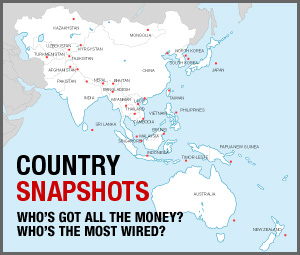China’s Not a Superpower 
 Image: Poeloq
Image: Poeloq
…and won’t be anytime soon, according to Minxin Pei, who says its political and economic situation is more precarious than it looks.
With the United States apparently in terminal decline as the world’s sole superpower, the fashionable question to ask is which country will be the new superpower? The near-unanimous answer, it seems, is China. Poised to overtake Japan as the world’s 2nd largest economy in 2010, the Middle Kingdom has all the requisite elements of power–an extensive industrial base, a strong state, a nuclear-armed military, a continental-sized territory, a permanent seat on the United Nations Security Council and a large population base–to be considered as Uncle Sam’s most eligible and logical equal. Indeed, the perception that China has already become the world’s second superpower has grown so strong that some in the West have proposed a G2–the United States and China–as a new partnership to address the world’s most pressing problems.
To be sure, the perception of China as the next superpower is grounded, at least in part, in the country’s amazing rise over the last three decades. Powered by near-double digit economic growth since 1979, China has transformed itself from an isolated, impoverished and demoralized society into a confident, prospering global trading power. With a GDP of $4.4 trillion and total foreign trade of $2.6 trillion in 2008, China has firmly established itself as a premier world economic powerhouse.
Yet, despite such undeniable achievements, it may be too soon to regard China as the world’s next superpower. Without doubt, China has already become a great power, a status given to countries that not only effectively defend their sovereignty, but also wield significant influence worldwide on economic and security issues. But a great power is not necessarily a superpower. In world history, only one country–the United States–has truly acquired all the capabilities of a superpower: a technologically advanced economy, a hi-tech military, a fully integrated nation, insuperable military and economic advantages vis-à-vis potential competitors, capacity to provide global public goods and an appealing ideology. Even in its heydays, the former Soviet Union was, at best, a one-dimensional superpower–capable of competing against the United States militarily, but lacking all the other crucial instruments of national power.
Meanwhile, the challenges China faces in becoming the next superpower are truly daunting. Even as its economic output is expected to exceed $5 trillion in 2010, per capita income in China will remain under $4000, roughly one-tenth of the level of the United States and Japan. More than half of the Chinese population still live in villages, most without access to safe drinking water, basic healthcare, or decent education. With urbanization growing at about 1 percent a year, it will take another three decades for China to reduce the size of its peasantry to a quarter of the population. As long as China has an oversized peasantry, with hundreds of millions of low-income rural residents surviving on the margins of modernity, it is unlikely to become a real superpower.
To believe that China is the next superpower, it’s also necessary to assume that China’s super-charged economic growth will continue. Unfortunately, relying on any country’s past performance to predict its future prospects is a risky proposition. China’s stunning economic growth performance since 1979 notwithstanding, its ability to sustain the same level of growth is by no means assured. In fact, the likelihood that China’s growth will slow down significantly in the next two decades is real and even substantial. Several favourable structural factors, such as the demographic dividend (derived from a relatively younger population), virtually unlimited access to the global markets, high savings rates and discounted environmental costs, will gradually disappear. Like Japan, China is becoming an ageing society, due in no small part to the effectiveness of the government’s stringent one-child policy (which limits urban families to a single child). The share of the population 60 years and above will be 17 percent by 2020, and this ageing will increase healthcare and pension costs while reducing savings and investments. Although the exact magnitude of the reduction in the savings and the increase in healthcare and pension spending is uncertain, their combined negative effects on economic growth could be substantial.










